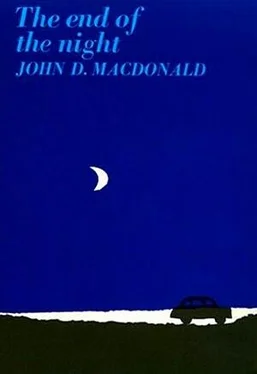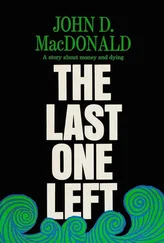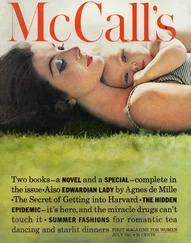“Difficult? You’re impossible.”
“You’re the bright architect. Whip me up a dream, boy.”
Ever since they had talked, he had been working out the problems in the back of his mind. He decided that a hillside house would be best. The hill should be abrupt, but not necessarily high, and overlooking an emptiness of vista where nothing could suddenly rise up and stare in at them. Then, with glass, he could give her all the light and sun and space she craved, and with a big cantilevered deck in front of it, nobody could stare up into the house.
After he had left Dunnigan’s temporary office, he had gone home and started to work, sketching front and side elevations, balling them up and discarding them until he was close to what he wanted. He had secretly located a two-acre hillside tract south of the city and had paid thirty per cent down and signed a mortgage deed for the balance. It was to be his wedding present to her.
Now he was working on the floor plan. The house would be on three levels. He knew it was good. When he worked on something good he got a special feeling in the pit of his stomach. This could be a gem. This could be the best thing he had ever done.
He worked with a special dedication, a unique intensity. Without bothering to clarify it in his mind, he felt that it was an affirmation. If he worked well enough, and hard enough, then they would one day live together in love in this place taking shape and form on his drawing board. If he did not do it well, she was lost forever. It was his incantation, his offering. It was the only thing he could do which would bring her back. She would have to come back to a place so special. Any other outcome was inconceivable.
And so, deep in the fury of concentration, he was not quite sane. But he was using himself utterly, and that was all he could do.
A bright, round, flawless sun came up out of the Atlantic on the twenty-seventh day of July. An enormous and stationary high pressure area covered all of the Northeast and the Middle Atlantic states, and reached as far west as Illinois. Vacationers congratulated themselves on having selected that segment of the summer which included these perfect days. Those whose vacations were over wished they had waited. Those who had not yet gone, hoped the weather would hold.
The newspapers which thudded against front doors and were stuffed in rural tubes, dropped in heavy bundles on street corners, inserted in store-front racks, yelped and thumped and yammered about the Wolf Pack. The early commentators said, with mock regret, that the criminals were still at large. On buses and subways, over breakfast tables and lunch counters, around office water coolers and factory Coke machines, the nation talked about the Wolf Pack and Helen Wister.
“It’s a terrible, terrible thing. Her poor parents. — If a guy was going to steal him a blonde, he couldn’t do better, hey, Barney? — Mark my words, when they capture those fiends, they’ll find they have been drinking alcohol, Mary. — You know, that’s the kind of deal Bugsie would pull, he had the nerve. — This is another example of the accelerated decay of public morals, gentlemen. — The broad with the knife, that’s the one for me, Al. I go for the mean, gutsy ones. — You can’t tell me it wasn’t all planned between her and those thugs. I’ll bet you she paid them to kill that boy friend of hers on account of he was blackmailing her with that architect. Had enough money, didn’t she? Didn’t put up any fight, did she? Well?
The sun climbed high and bright toward noon. Four hundred and thirty miles north-northeast of Monroe, up in the western end of the state of Pennsylvania, was the small resort community of Seven Mile Lake. The whole south shore of the lake was a long strip of tawdry honky-tonks — ice-cream stands, boat rentals, shooting galleries, lunchrooms, cabins, cottages, beer joints. It was the height of the vacation season. Jukes whined and thumped. Boats roared up and down the lake, towing water-skiers. The pebbly beaches were half paved with the baking, simmering flesh of the sunbathers. Squalling children dropped ice cream in the dust.
In the middle of the commercial area were the Lakeshore Cottages, managed this season by Joe Rendi and his wife, Clara. They handled the rental of the cottages and operated the small ice cream and sundries store at the roadside, on a percentage basis. Joe got up, surly as usual, at eleven. He went down the street for breakfast and then walked slowly back to the store. There were no customers at the moment. Clara was washing glasses.
“What the hell was the night bell last night?” he demanded.
“You heard it? You mean you really heard it? Tanked on beer so bad you snore like a walrus couldn’t sleep in there too, and you heard it?”
“Cut the goddam comedy. What was it?”
“I rented number four, that’s all.”
He sat down heavily on the stool and stared at her. “Oh, great! Oh, fine and dandy and nifty! You rented number four. Bully for you! And tomorrow comes those people for all the way up to Labor Day and a hunnert twenny-fi dollars a week and a fifty-dollar deposit we got already and you can say sorry, we’re full up.”
“So you’re so smart, why didn’t you get up?”
“It wasn’t so hot, I’d clout you in the mouth one, Clara.”
“If you’re so smart, how’d you get us stuck in a deal like this, working like a dog all summer and for what?”
“So the take is little, so you cut it down.”
“So I increase it, wise guy. Somebody has to get smart around here.”
“So how do you increase it?”
She straightened up with her hands on her hips. “One night only. He swore it. I believe him. Just before dawn, he rang the bell. Two couples, he said. Twenty-five bucks, and they’ll leave tonight, he said. It don’t go on the books, Joe. This one is all ours. I’ll clean it up before the Shoelockers get here tomorrow. Honest to Christ, stop looking so confused. And don’t think you’ll get aholt of that money. You can twist my arm right the hell off, and I won’t tell you where it is.”
“Suppose they don’t get out?”
“He said they would. A nice-talking fella, he is. I had him sign a card. He didn’t want to look at number four first. I tore up the card already. So what skin is off you.”
“They better get out,” Joe said darkly.
“They will! They will! They will!”
“So stop yelling at me, can’t you?”
“Go fix the lock on number eight. It’s loose. All it needs is a screw driver, and they can’t do it themself for some reason.”
Joe Rendi walked by number four on his way to fix the lock. A dark-blue Buick was parked close beside the side steps, heading out. The blinds were closed. The place looked very still. What a way to use a vacation, he thought. Drive all night, sleep all day. Twenty-five bucks is twenty-five bucks. She could have got thirty, maybe.
It was one of the big cottages. There were six big ones and eight little ones. The big ones had a sitting room, bathroom, screened porch and two bedrooms and a tiny kitchen in one corner. The little ones had but one bedroom. They were old, flimsy frame cottages, dressed up for summer in new paint — bright yellow with bright-blue trim and red front doors.
Number four was silent throughout the long, hot day. Children yelped in the dusty areas between the cottages. Insects keened in the afternoon heat. The noise of fast boats was unending.
Later, as the dusk deepened, neon came on, up and down the strip, and day noises faded as the night sounds began.
At eight-thirty, when it was dark, Joe Rendi got nervous about number four. He strolled back there, wondering if he would have to remind them of their promise to check out. He stared, turned and hurried back to the store.
Читать дальше







![Джон Макдональд - The Hunted [Short Story]](/books/433679/dzhon-makdonald-the-hunted-short-story-thumb.webp)


